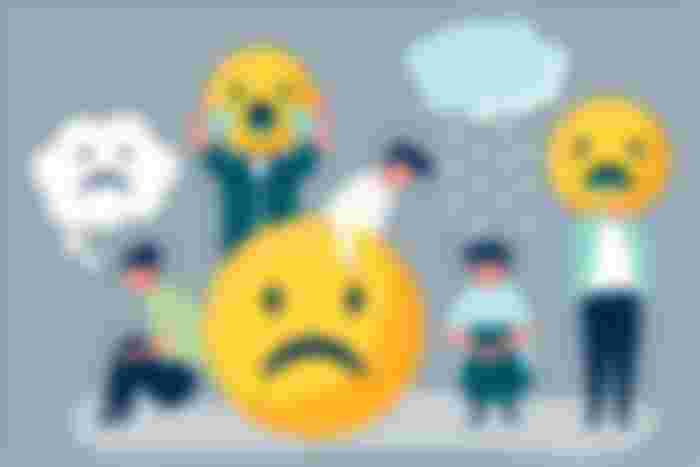Emotions are exhibited by a change in physiological activity which is followed by certain feelings and behaviors that are characteristic of that emotion as well as specific facial expressions. Emotional regulation is when people “monitor their internal psychological responses and attempt to adjust them to meet their standards for how one ought to respond” (Maddux & Tangney, 2010, p. 76). For example, a doctor who is about to tell a family that their grandmother died will not be smiling while they do so even if they are feeling cheery because the current social situation dictates that this is a time for sorrow and mourning. Being able to control our emotions in certain situations allows people to bond and make connections with those they are with at that moment. Someone who is unable to properly regulate their emotions may find themselves ostracized and alienated by the group because the group believes that this person cannot share and understand the emotions they are currently feeling.
Shame & Guilt
Shame and guilt are both emotions that are known as “self-conscious emotions” (Maddux & Tangney, 2010, p. 247). Shame is considered a more public emotion that can form from public disapproval and judgements about the self while guilt can develop from a more private experience that evolves from the belief that the self has done something wrong to another. Feelings of shame and guilt can be normal and let us know when we have done something wrong and that some sort of reparative action is needed.
Guilt is adaptive because it directs our attention to the effect our behavior and actions have on others. This motivates people to undo the harm that was done by apologizing, confessing, or doing some other action that can repair what was damaged (Maddux & Tangney, 2010, p. 254). Shame can also be adaptive because it can discourage people from taking on tasks that they do not have the skills or abilities to complete or in situations where the outcome is uncontrollable. Another way shame could be adaptive is that the fear of being shamed could keep people from doing bad things thus decreasing the likelihood of them committing transgressions (Maddux & Tangney, 2010, p. 256). However, this may be more applicable to collectivist cultures than individualistic ones because in collectivism the shame you bring to yourself is also brought to your entire family.
While guilt and shame can be useful in small doses, they can also become problematic. People who experience an excess of shame can develop mental health disorders such as anxiety, depression, eating disorders, and low self-esteem (Maddux & Tangney, 2010, p. 259).
Those who experience an excessive amount of shame about the way they look could develop distorted body images and an array of eating disorders. A woman who is constantly judging herself and thinks she looks fat and ugly could develop anorexia because she believes that in order to be beautiful and shame-free one must be thin and perfect. Guilt can also become a problem when it is chronic.
There are certain situations when it is appropriate to feel guilt, however these feelings can become a problem when they become inappropriate, pervasive, and long-lasting (Maddux & Tangney, 2010, p. 258). If people are unable to properly cope with their guilt or feel guilt in situations that should not elicit it then there is a problem. If a person breaks a coworker’s coffee mug by accident and has already apologized and bought them a new mug but is still experiencing feelings of guilt, then their ability to cope with these feeling and resolve them has been damaged and the way they experience guilt has now become problematic.

Envy & Jealousy
Envy and jealousy differ from the emotions of shame and guilt in that they are considered “social-comparative” emotions (Maddux & Tangney, 2010, p. 249). Envy is characterized by a dissatisfaction with what one has and a desire to possess what others have. On the other hand, jealousy is the belief or suspicion that what one possesses is in danger of being taken away or lost.
A way that envy can be adaptive is that it motivates people to better themselves and their lives, improve their abilities and skills, and become more productive. It can also play a potential role in the development and formation of a person’s identity (Maddux & Tangney, 2010, p. 257). When a coworker gets the promotion that you wanted are you envious because of the pay raise or because of the increase in power? The answer could show the person what they really desire and care about in life.
On the other hand, jealousy can be adaptive because it can signal to a person that someone they care about is about to be taken from them if they do not give them the attention they need and deserve (Maddux & Tangney, 2010, p. 258). It reminds us that someone we love could be taken from us if we ignore their needs and wants.
Like shame and guilt, jealousy and envy can develop into problematic and serious psychological issues. Narcissistic personality disorder can involve extreme levels of envy that cause people to believe that others do not deserve the success they are given which can lead them to fantasize about harming their rivals as well as think of ways to undermine or interfere with other’s achievements (Maddux & Tangney, 2010, p. 260). If someone is caught trying to poison their rival or destroying their research, then their own lives could be ruined and they could possibly face jail time.
A person who is experiencing excessive jealousy could develop a jealous type delusional disorder. The person is convinced that their loved one is cheating on them or is going to cheat on them in the near future (Maddux & Tangney, 2010, p. 260). They will confront their partner with imaginary evidence and sometimes take drastic measures such as harming their partner or even filing for divorce because they believe that their significant other has been unfaithful. A person’s inability to regulate their jealousy and appraise the situation appropriately can have detrimental effects on their mental health and relationships.
Conclusion
While emotions are necessary for us to function in society, an excess of certain emotions can have drastic and dangerous effects on people’s well-being and their relationships with others. Experiencing healthy amounts of shame, guilt, envy, and jealousy help people properly function and even better themselves in their everyday lives. However, when these emotions become inappropriate they can become problematic and have detrimental affects on a person’s psychological health and their ability to behave appropriately in social settings.
References
Maddux, J. E., & Tangney, J. P. (Eds.). (2010). Social psychological foundations of clinical psychology. New York, NY: Guilford Press.
